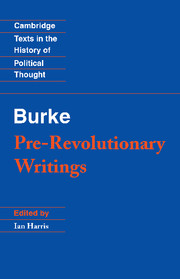Book contents
- Frontmatter
- Contents
- Preface
- Acknowledgements
- Abbreviations
- Chronological table
- Introduction
- A note on the texts
- Biographica
- Bibliography
- ‘Extempore Commonplace on The Sermon of Our Saviour on the Mount’
- A Vindication of Natural Society
- A Philosophical Enquiry into the Origin of our Ideas of the Sublime and Beautiful
- ‘Religion’
- Tracts on the Popery Laws
- Thoughts on the Cause of the Present Discontents
- Conciliation with America
- ‘Almas Ali Khan’
- ‘Speech on the Army Estimates’
- Index of persons
- Index of subjects and places
- Cambridge Texts in the History of Political Thought
A Philosophical Enquiry into the Origin of our Ideas of the Sublime and Beautiful
Published online by Cambridge University Press: 05 June 2012
- Frontmatter
- Contents
- Preface
- Acknowledgements
- Abbreviations
- Chronological table
- Introduction
- A note on the texts
- Biographica
- Bibliography
- ‘Extempore Commonplace on The Sermon of Our Saviour on the Mount’
- A Vindication of Natural Society
- A Philosophical Enquiry into the Origin of our Ideas of the Sublime and Beautiful
- ‘Religion’
- Tracts on the Popery Laws
- Thoughts on the Cause of the Present Discontents
- Conciliation with America
- ‘Almas Ali Khan’
- ‘Speech on the Army Estimates’
- Index of persons
- Index of subjects and places
- Cambridge Texts in the History of Political Thought
Summary
Introduction
The ‘Extempore Commonplace’ and A Vindication of Natural Society suggested that revelation was recognizably part of the divine order. The earlier text had praised revelation for informing moral conduct, whilst the later work suggested that the logic of deism admitted a view of the social order unacceptable to most minds in eighteenth-century England. By the same token, A Vindication implied some approval of society as presently constituted. A further form of inequality had found its way onto Burke's agenda. His attachment to an unequal social order had been expressed at Trinity, when he adverted to its potential for good. That position now achieved a theoretical elaboration.
The Enquiry employed the idiom of nature and did so with a determinate purpose. As ‘Nature’ was attractive to the eighteenth century, the content attributed to it varied with a writer's object. Deists had emphasized nature as reason. Rousseau had found nature in the simplest of lives. Burke himself set out to show that natural passion was God's medium of expression and suggested that nature grounded inequality.
To understand Burke's case we should consider another of his interests. At Trinity he had declared himself not only about religion and property, but also about taste. Burke took the view that the province of the imagination was important for forming good morals. It followed that the beliefs people entertained about aesthetics had a bearing upon their conduct.
- Type
- Chapter
- Information
- Pre-Revolutionary Writings , pp. 58 - 77Publisher: Cambridge University PressPrint publication year: 1993
- 6
- Cited by



